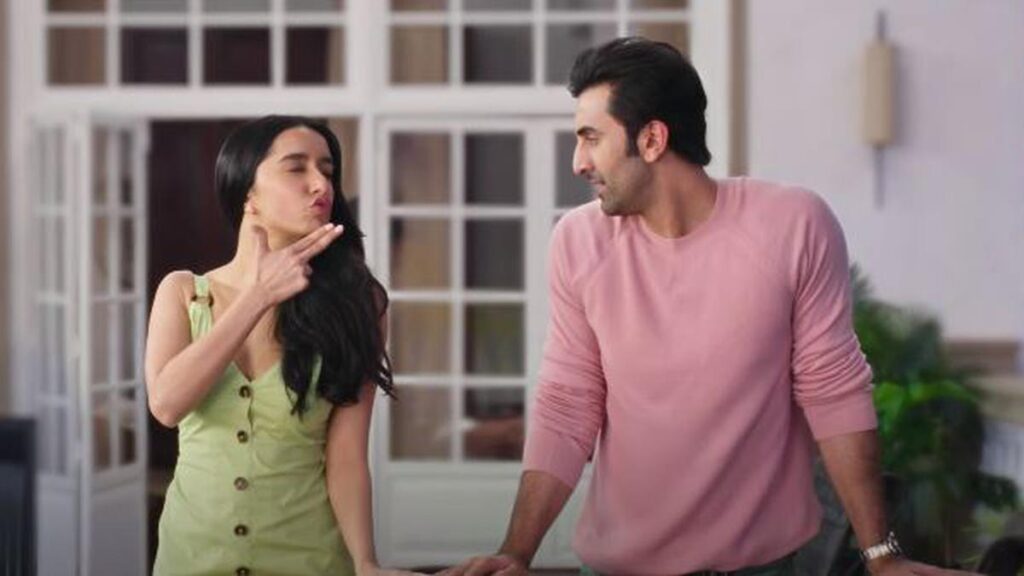Luv Ranjan’s recent outing, Tu Jhoothi Main Makkaar (TJMM), is a romcom that regressively emphasizes that a woman should never outweigh the importance of family even if it be at the cost of her independent entity. With this dubious premise in mind, Ranjan ends up concocting an unconvincing mix of a so-called contemporary tale blended with ‘traditional’ themes’ of familial bonding once popularized by the Rajshri, Yashraj and Dharma productions stables. To make things worse, TJMM suffers from a total lack of both originality and creativity. As Ranjan takes his viewers for granted, his uninspired storytelling only ends up in prolonging their misery and that too for a good 164 minutes, the running time of the film.
The film begins with Rohan Arora, aka Mickey (Ranbir Kapoor), amicably helping a couple break up without either blaming the other for their permanent separation. In fact, Mickey runs a break-up agency with his friend, Manu Dabbas (Anubhav Singh Bassi), which helps couples in distress get untangled from suffocating relationships. All for a serviceable fee, of course. Mickey belongs to an affluent family consisting of a mother, Renu Arora (Dimple Kapadia), a father, Ramesh Arora (Boney Kapoor), a grandmother (Jatinder Kaur), a sister (Hasleen Kaur), and a niece (Inayat Verma). Dabbas, who is unwilling to tie the knot with the over-caring Kinchi (Monica Chaudhary), nevertheless goes to Spain with Mickey for his bachelor party. Tinni (Shraddha Kapoor), a friend of Kinchi, accompanies her to Spain and instantly attracts Mickey’s attention. Mickey leaves no stone unturned to make Tinni fall for him. But she prefers to flirt with him at best rather than get committed into a relationship. Predictably though, she finally falls in love with him. On their return, Mickey introduces Tinni to her family, and they shower her with so much love and affection that she finds herself trapped in the relationship and wants out. Unknowingly, she calls up Mickey’s break-up agency for help…
Tu Jhoothi Main Makkaar is yet another Hindi film that takes the level suspension of disbelief to the unbelievable. Mickey and Tinni, who are in love with one another and have spoken to one another over the phone countless times, do not recognize the other’s voice when she calls him for her breakup. Throughout the film, verbosity takes centre stage, sacrificing many a silent, introspective or subtle moment that would help the viewer gauge his own emotional investment in the characters. Right from the long monologue in the first half where Mickey gives one reason after another on why Tinni should fall in love with him to the scene where he tells an asleep Tinni why he won’t disclose his identity as the guy helping her with the break-up soon, feelings are expressed only through dialogues. Even Tinni’s reasons for not falling in love with Mickey instantly are revealed in a similar manner.
Ranjan’s films have always been the epitome of misogyny and gaslighting and TJMM is no exception. Of course, it is the woman who is at fault. Tinni’s decision to live an independent life while embracing a nuclear family is projected as a negative one. As is her choice to break up. And unlike the filmmaker’s previous outing, like Sonu Ke Titu Ki Sweety (2018), which had an unconventional ending, TJMM treads the beaten path. The film uses clichéd tropes and sticks to a finish that we have seen over and over. For instance, the climax sequence of stopping the heroine from boarding an international flight is done so garrulously that rather than being funny and emotional, it becomes painfully tiring. One cannot help but remember the climax of Jaane Tu… Ya Jaane Na (2008) by Abbas Tyrewala, where a similar situation was executed with much freshness.
Ranbir Kapoor as the charming and uber-cool man, who considers his family above everything else, fits comfortably in the shoes of Mickey. Shraddha Kapoor, as Tinni, also does a commendable enough job as a modern woman on the horns of a dilemma to choose between her career and love. Both of them are the big redeeming features in a film that is otherwise trite and lacks depth in characterization. Dimple Kapadia, as Mickey’s mother, is particularly loud and caricature-like from the first to the last scene of the film In fact, all the supporting cast, from Anubhav Singh Bassi to Mickey’s lovely niece Inayat Verma, are nothing but irritating chatterers. The moderately satisfactory cameos by Kartik Aaryan and Nushrat Bharucha are used more as a device to show that Tu Jhoothi Main Makkaar is a thematic sequel to all other Ranjan films where the man has some moral and ethical lessons to impart to the woman.
Santhana Krishnan Ravichandran photographs the film with colourful palettes and ensures that every frame looks attractive but the cinematography does not contribute much to the psychological understanding of the character. The editing (Akiv Ali and Chetan M Solanki) tries to maintain a steady and pacy rhythm, but the running time tells heavily on the film. The sound design is dominated by Hitesh Sonik’s loud background without giving any of the scenes even a few moments of silence. The music composed by Pritam does add some liveliness to the film, but the placement of songs is far too predictable. However, O Bedardeya, sung by Arijit Singh, does comes as a relief because, for once, the characters are not delivering dialogues to express their feelings.
Tu Jhoothi Main Makkaar looks like it was executed in a tearing hurry without fleshing out the screenplay properly. It is little more than a lousy rehash of some far more intelligently handled films on similar themes and only ends up strengthening the argument for those who feel that current Hindi cinema has lost the plot. The film certainly has.
Hindi, Romcom, Drama, Color



Great review